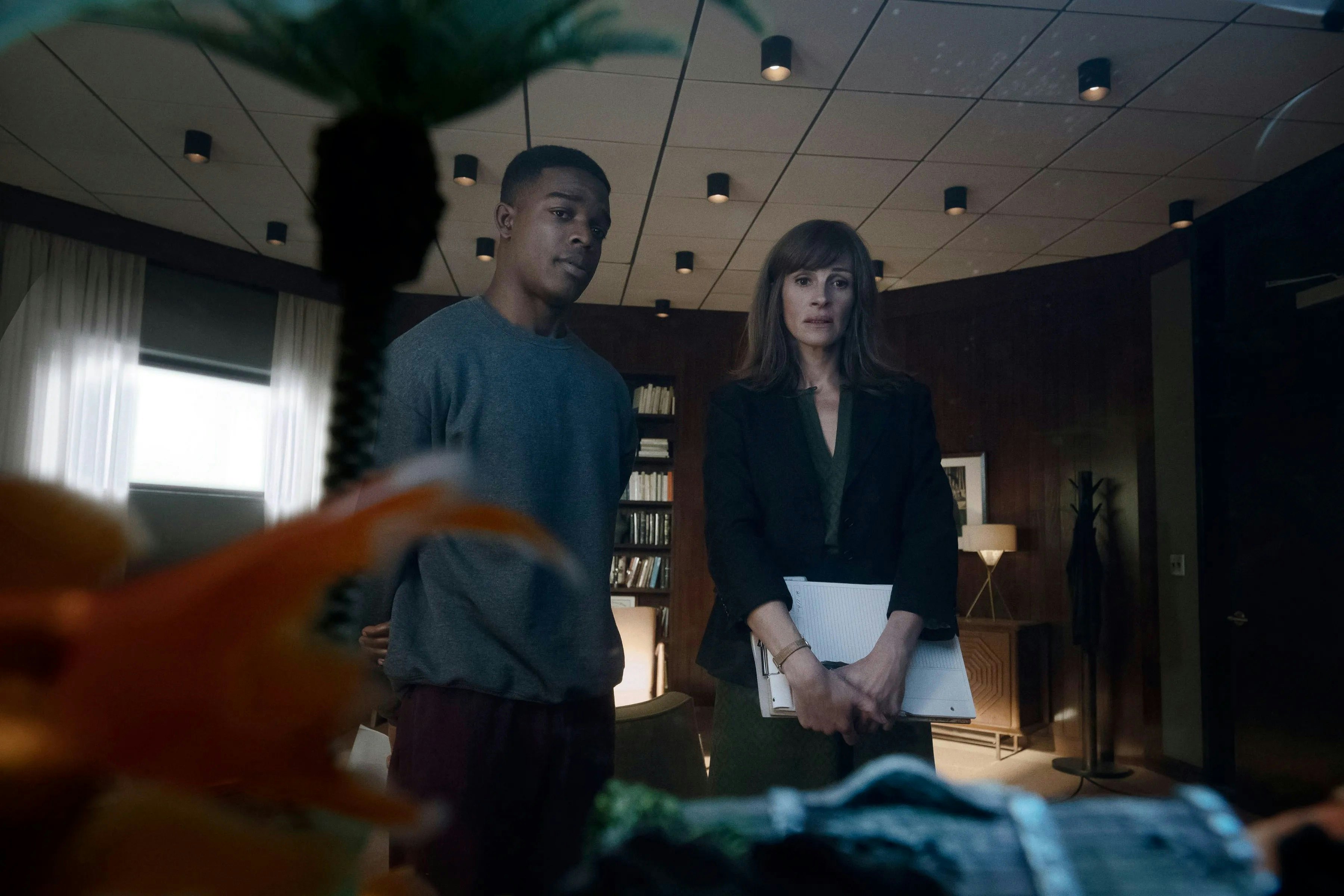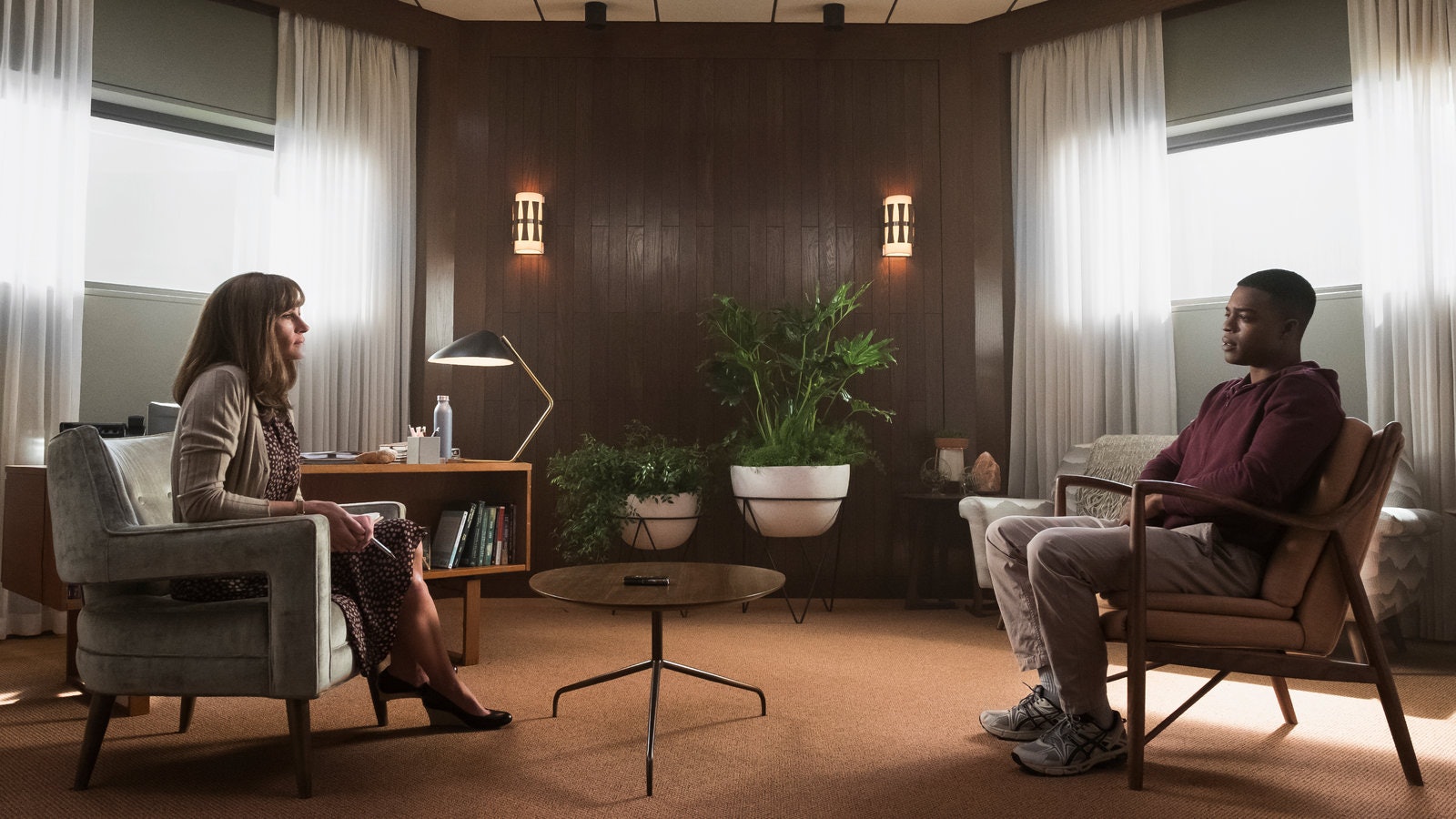
Following a limited theatrical release, Sam Esmail’s Leave the World Behind is finally streaming on Netflix. The thriller, about a family (led by Julia Roberts) whose vacation comes to a jarring halt when the owners of their rental return early due to a widespread blackout, offers a relatively compelling storyline and excellent character work. But it’s not Esmail and Roberts’ best team-up. The duo’s most memorable partnership happened on the small screen five years ago in the form of Prime Video’s Homecoming.
Created by Eli Horowitz and Micah Bloomberg as a scripted podcast series for Gimlet Media in 2016, the TV version was released to immediate critical acclaim on Prime Video at the end of 2018. Despite its near-universal praise, it slipped off most people’s radars by the new year and mostly missed out on any major awards. By the time the shortened second season rolled around in 2020, sans Roberts as an actor and Esmail as a director, the show had largely lost its traction and failed to recreate its original magic. But the first season of the show remains stellar, unforgettable mystery box television with a surprisingly heartfelt center.
The season is set in two timelines, which it flashes between throughout the 10 episodes. The first takes place at a military sub-contracted facility purported to help soldiers transition back into everyday life with the aid of a mysterious medication meant to manage harmful memories. As is the case with most corporations (in this story, it’s the mysterious Geist Emergent Group) preaching public good, there’s some questions surrounding the exact purpose of the Homecoming Transitional Support Center. But Heidi Bergman (Julia Roberts), the head counselor at Homecoming who uprooted her life to move to the program’s Florida location, naively believes in the mission and takes pleasure in her work with the soldiers. This is never more clear than in her interactions with her favorite patient, 20-something Walter Cruz (Stephan James), a charismatic army sergeant fresh off of deployment and exhibiting some signs of post-traumatic stress disorder.
The second timeline follows Heidi a few years after the Homecoming program has fallen apart. It’s unclear exactly what has happened, but Heidi is working as a waitress, living with her mother, and doesn’t seem to remember a whole lot about her time in Florida. Something happened, that much is clear, and a persistent investigator played by Shea Whigham begins to prod into what, exactly, went down at the facility that no one seems to want to talk about. This present is framed in a 1:1 aspect ratio, jarring and keeping everything that is peripheral in the dark. In contrast to the full-screen depiction of Heidi’s past, it’s a damning portrayal of just how much you miss in the present without memories to fill things in.

The plot and camerawork are a clever tribute to 1970s paranoia/conspiracy thriller films, and the latter utilizes cinematography stylings that fans of Alfred Hitchcock and Alan J. Pakula might recognize. In an era where even most comedies now seem to be an hour long, it’s also a pleasure to find not just a show (but a drama) that caps its episode runtime at around 30 minutes.
While the overarching mythology, camerawork, and supporting performances (including outstanding work from Bobby Cannavale, Jeremy Allen White, Hong Chau, and Sissy Spacek) helped create a show that was so initially alluring, what made it one of best series of 2018 all came down to Roberts and James.

The entire premise only works because of the chemistry between the two leads. It’s an easy, casual intimacy with a hint of flirtation. The show never quite makes it explicitly romantic; but it is affectionate, devotional, and ultimately loving. It’s clearest in their back-and-forth during one-on-one sessions, when Heidi straightens the items on her desk – usually her pen – only for Walter to playfully, compulsively tilt them again so that they’re askew.
This levity and bond gives Homecoming a soft emotional tether buried in the show’s sharp thriller edges, culminating in a surprisingly generous conclusion for a series that is otherwise so skeptical about human intention. Any small bumps are smoothed over by the final episode — the final scenes, really — which (thanks to the help of Iron & Wine) offer a hopeful ambiguity and question what’s worth remembering, even if it brings a tremendous amount of pain, and what defines people, if not the memories of the events and people that shaped them.







